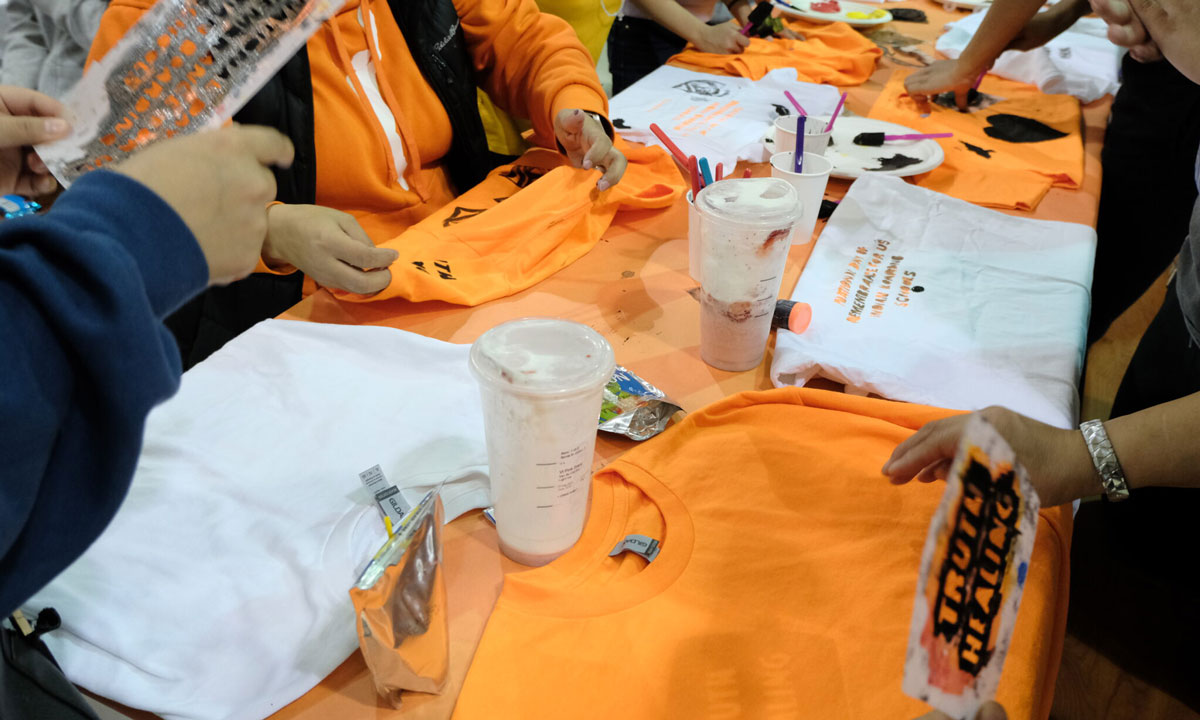Alaska Remembers Indian Boarding Schools on Orange Shirt Day, Aims to Teach & Heal
Once a suppressed history in Alaska, events across the state aim to educate children on the history of Indian boarding schools.

Get stories like this delivered straight to your inbox. Sign up for The 74 Newsletter
Lucian Painter carefully applied black paint to an eagle stencil on a bright orange shirt in the crowded gymnasium of Alaska Native Cultural Charter School in Anchorage on Wednesday night. He is 6 years old, and said has already learned a little about Orange Shirt Day, commemorated as the National Day of Remembrance of Indian Boarding Schools. Then he added a scientist with a potion to his t-shirt.
“We’re working on it,” said his mother, Heather Painter, as she helped his two younger siblings. They planned to go to the school’s showing of “Grandpa’s Drum,” an episode of the children’s television show Molly of Denali, that takes on the history of boarding schools in a way children can understand.

This event, and others like it across the state, are part of a broader, more open reckoning with the traumatic history of boarding schools for Alaska Native people. Orange Shirt Day began in Canada in 2013 and is now observed by many people and organizations in the United States. It recognizes the legacy of trauma and abuse at boarding schools. Local organizers say these events are intended to heal people whose loved ones experienced boarding schools and to prevent generational trauma for their children and grandchildren.
“It’s part of our history,” said principal Sheila Sweetsir as she welcomed families at the door. “The more that the community learns about it, you know, the better awareness that everybody has on Orange Shirt Day.”

More than 200 people signed up for the event.
The gymnasium was full of families, laughter, and freshly painted t-shirts with messages like “Healing Starts with Truth,” “September 30” and “National Day of Remembrance for Indian Boarding Schools.”
There were boarding schools at more than two dozen locations in Alaska. The U.S. government and some church groups began boarding school programs for Alaska Native children in the late 1800s. Most of them separated young children from their families and forcibly immersed them in Euro-American traditions and the English language. Alaska Quakers have formally apologized for the schools; former Gov. Bill Walker did as well.

Tara Stiller handed out juice packets and cookies at one end of the room. Last year, she started this event while she was the program director of Alaska Children’s Trust. She said it is an opportunity for the community to raise awareness, share stories and release grief.
“These kids are the next generation of future generations recognizing this trauma,” she said. “Many of our families are suffering, trying to cope with the trauma of being silenced by the government and religion, assimilation of boarding schools, the loss of culture, the loss of language.”
Stiller said she didn’t learn the history of boarding schools until she was an adult. It wasn’t part of her curriculum in school or college. She said she learned it from American Indian and Alaska Native leaders who shared their stories. She called the event “primary prevention,” a healing effort that takes place before negative health effects.
“They know the truth,” she said. “Now they know and they can start to heal themselves and build that compassion, understanding and respect for their parents and grandparents who may be suffering.”
In the hall, fourth grade teacher Georgianna Starr greets students and parents and guides them towards the bustling gym or the theater where Molly of Denali is showing.

The history of boarding schools wasn’t part of the school’s curriculum while she was growing up in Scammon Bay, so she feels good to bring the awareness of generational trauma to her students.
“It’s always an explanation of why things are the way they are, but it’s also an enduring strength of our people. I tell them, ‘Your parents or grandparents are survivors,’” she said. “Our elders, our grandparents, our aunts, our uncles — we all know somebody who’s been affected by boarding schools, one way or another. And so one of the important things is to not forget what their stories are.”
She said it is important for youth to understand how the past affects the future, and that she sees awareness gaining momentum. She said when the state recognized Indigenous Peoples Day in 2015 it was a good step. It’s marked on the second Monday in October.
The recent history of forced assimilation and cultural genocide at boarding schools in the state is heavy subject matter for the school’s youngest students, but preschool teacher Melissa Kahler-Afelin said she teaches the subject in a way they can understand.
“I think that we need to give them credit for the empathy piece. And so we start at the emotions associated with historical trauma,” she said. She uses a curriculum developed by the Alaska Native Heritage Center and the Alaska Children’s Trust that goes with the Molly of Denali episode. “We relate it to their grandparents,” she said.
Kahler-Afelin said it is important to talk about hard things, so that students are resilient in the future. She said it is bittersweet when students share what they learn with their families.
“Some families are very emotional towards the healing coming from their youngest, and being able to talk about their family’s history,” she said. “But then we also do a lot of joy and celebration around traditional foods and using traditional names.”
Alaska Beacon is part of States Newsroom, a network of news bureaus supported by grants and a coalition of donors as a 501c(3) public charity. Alaska Beacon maintains editorial independence. Contact Editor Andrew Kitchenman for questions: [email protected]. Follow Alaska Beacon on Facebook and Twitter.
Get stories like these delivered straight to your inbox. Sign up for The 74 Newsletter

;)